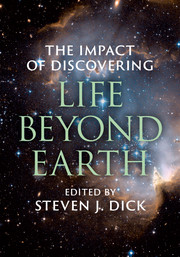Book contents
- Frontmatter
- Dedication
- Contents
- List of contributors
- Introduction: Astrobiology and society
- Part I Motivations and approaches: How do we frame the problems of discovery and impact?
- Part II Transcending anthropocentrism: How do we move beyond our own preconceptions of life, intelligence, and culture?
- Part III Philosophical, theological, and moral impact: How do we comprehend the cultural challenges raised by discovery?
- 10 Life, intelligence, and the pursuit of value in cosmic evolution
- 11 “Klaatu Barada Nikto” – or, do they really think like us?
- 12 Alien minds
- 13 The moral subject of astrobiology: Guideposts for exploring our ethical and political responsibilities towards extraterrestrial life
- 14 Astrobiology and theology
- 15 Would you baptize an extraterrestrial?
- Part IV Practical considerations: how should society prepare for discovery – and non-discovery?
- Contributor biographies
- Index
- References
13 - The moral subject of astrobiology: Guideposts for exploring our ethical and political responsibilities towards extraterrestrial life
from Part III - Philosophical, theological, and moral impact: How do we comprehend the cultural challenges raised by discovery?
Published online by Cambridge University Press: 05 November 2015
- Frontmatter
- Dedication
- Contents
- List of contributors
- Introduction: Astrobiology and society
- Part I Motivations and approaches: How do we frame the problems of discovery and impact?
- Part II Transcending anthropocentrism: How do we move beyond our own preconceptions of life, intelligence, and culture?
- Part III Philosophical, theological, and moral impact: How do we comprehend the cultural challenges raised by discovery?
- 10 Life, intelligence, and the pursuit of value in cosmic evolution
- 11 “Klaatu Barada Nikto” – or, do they really think like us?
- 12 Alien minds
- 13 The moral subject of astrobiology: Guideposts for exploring our ethical and political responsibilities towards extraterrestrial life
- 14 Astrobiology and theology
- 15 Would you baptize an extraterrestrial?
- Part IV Practical considerations: how should society prepare for discovery – and non-discovery?
- Contributor biographies
- Index
- References
Summary
In the event that we discover extraterrestrial life, what ethical considerations ought to inform our interactions with it? In this chapter, we argue that astrobiology faces at least two significant roadblocks when it comes to addressing this quandary. The first is the well-known N = 1 problem (see Mariscal, Chapter 7 in this volume). Currently, we have merely one example of life (life on Earth), and one cannot safely make scientific generalizations from a single example about a presumably broader domain phenomenon. Since there are good reasons for suspecting that life elsewhere may deviate from Earth life in biologically significant ways (Grinspoon 1997; Benner et al. 2004; Schulze-Makuch and Irwin 2006), we must grapple with the difficulty of applying traditional ethical theories to hypothetical forms of life we know nothing about. Second, just as our concept of life is restricted to the single example of Earth life, the way we think about moral status is even more narrowly restricted to the members of a single species of life on Earth, Homo sapiens. Taken together, these two roadblocks pose a serious hurdle when it comes to theorizing about the intersection of ethics and astrobiology. Given the highly Earth-centric character of our understanding of life and the anthropocentric character of our concepts of morality, how can we even begin to address the question of our potential ethical responsibilities towards forms of life differing radically from ourselves?
Our goal is not to resolve this dilemma, which will inevitably persist in the absence of concrete examples of extraterrestrial life. Instead, the aim of this chapter is to highlight some of the challenges we face in applying our human-centered ethical theories to truly alien organisms and to propose possible avenues for fruitful research and theorizing about these issues in the future. We will examine the concept of a moral subject (a.k.a. patient), and explore what makes an entity the kind of thing that is capable of being unjustly wronged by a moral agent, such as you or me. That is, instead of focusing in an inward direction on what finding extraterrestrial life would mean to “us” – which remains an important but separate ethical quandary – we look in an outward direction at the moral responsibilities that “we” (human beings) might have towards alien forms of life.
- Type
- Chapter
- Information
- The Impact of Discovering Life beyond Earth , pp. 207 - 221Publisher: Cambridge University PressPrint publication year: 2015
References
- 3
- Cited by

